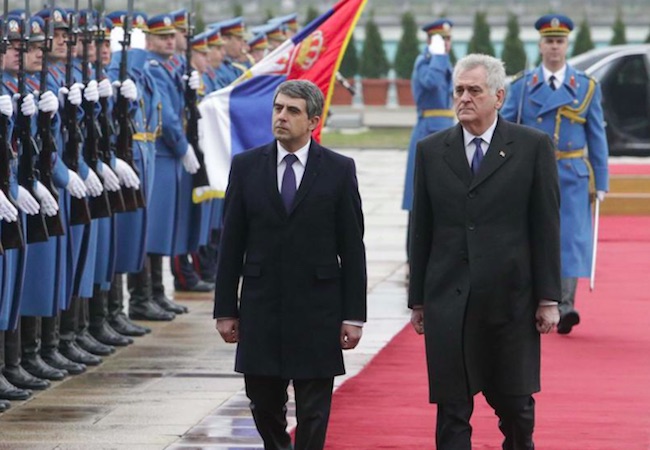
By Clive Leviev-Sawyer of The Sofia Globe
Energy inter-connectors between Bulgaria and Serbia and the infrastructure projects on Corridor 10 remain a shared priority for the two countries, Bulgarian President Rossen Plevneliev and his Serbian counterpart and host in Belgrade, Tomislav Nikolic, said on March 12.
Plevneliev was in the Serbian capital at the start of a two-day visit hosted by Nikolic, during which the Bulgarian head of state’s agenda also included a meeting with prime minister Alexander Vucic.
At a joint news conference after talks with Nikolic, the Bulgarian president emphasised that the construction of the gas inter-connector with Serbia would enhance energy security not only in each country, but also in the whole region.
“Each country in the region has the right to buy gas at a competitive price and to have access to alternative suppliers. Our energy security can be guaranteed only through ensuring the inter-connectedness of our networks and it is high time we pooled efforts to create a regional natural gas and electricity market,” Plevneliev said.
Serbia is in the process of drawing up a plan for the construction of an inter-systemic inter-connector. Speeding up the procedures on constructing the gas inter-connector is also planned.
The two presidents were adamant that the inter-systemic inter-connector is of key importance for ensuring the energy security of the countries in the region and would contribute to diversifying energy supplies.
The implementation of the projects on the Pan-European transport corridor 10 remains a priority and the construction of the highway between Sofia and the Serbian town of Nis is particularly important for the two countries.
Plevneliev highlighted as a positive development speeding up the activities related to the construction of a highway in the Serbian section, which is due to be completed in 2016. Forty-eight km from the Sofia ring road to Kalotina should be built.
At the same time Bulgaria is making considerable investments in the implementation of a lot of projects on Corridor 10, among which are the Maritsa highway, the north section of Sofia ring road and the high-speed railway from Plovdiv to Svilengrad.
Plevneliev and Nikolic also discussed opportunities for strengthening bilateral co-operation in the economy, energy, infrastructure, tourism, education and culture sectors.
The two leaders spoke positively of the strengthening of the trade and investment ties, and the exchange of tourists. About 312 000 Serbians visit Bulgaria annually and about 317,000 Bulgarians spend their holidays in Serbia.
The first joint meeting of Bulgaria’s and Serbia’s government is due to take place in 2015, it further emerged from the talks between the two presidents. The two countries are in the process of preparing a Friendship Agreement, Plevneliev announced.
Plevneliev said that the bilateral dialogue between Bulgaria and Serbia has become increasingly more intense and the progress of the whole Balkan region is apparent, which opens up new opportunities for co-operation.
Plevneliev said that European integration is a “historical chance to build a stable, democratic and prospering region, despite the bitter historical legacy.”
“The Balkans, which were given as an example of conflicts in the past, are an example of peace and good-neighborly relations today. Our similar historical fate is a basis on which we can build our future co-operation,” Plevneliev said, reiterating Bulgaria’s firm support for the European integration of the West Balkan countries.
The situation of the Bulgarian national minority in Serbia and particularly the issues related to ensuring education and information for ethnic Bulgarians in Serbia in their mother tongue were highlighted at the meeting.
“The Serbian side assured me that the problems will be addressed through dialogue and co-operation, and that the problem related to securing Bulgarian textbooks has been solved,” Plevneliev said.
Nikolic assured the Bulgarian head of state that Serbia will continue to provide assistance for guaranteeing the constitutional rights of the Bulgarian national minority in Serbia.
Bulgaria is ready, in co-operation with the Serbian institutions, to provide mechanisms for attracting more investments in the lagging behind border region, it emerged from the talks between the two presidents, a statement by the Bulgarian President’s office said.




